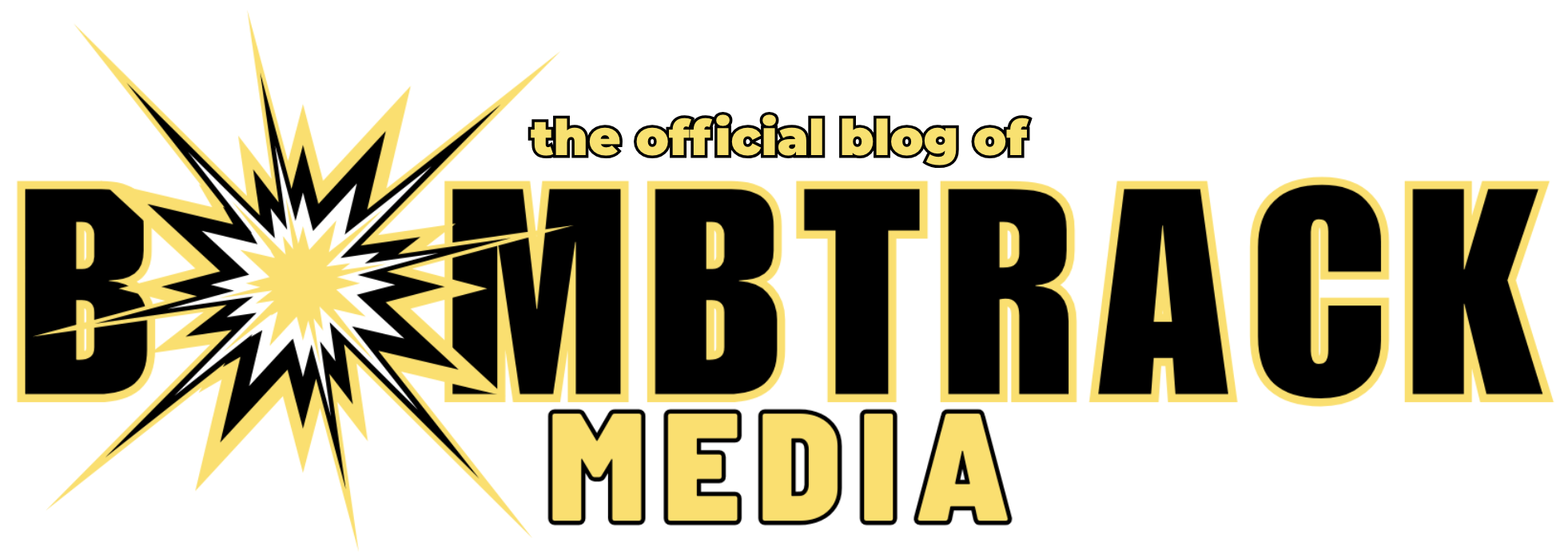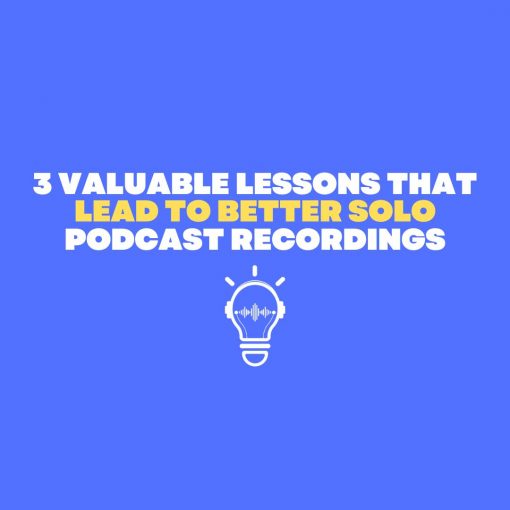 Solo Podcasts vs. Podcasts With Guests…
Solo Podcasts vs. Podcasts With Guests…
You may be wondering which is the best way to fly.
Honestly, the answer is completely subjective. Both formats offer incredible value for you and your brand objectives.
Today, I’m all in on solo podcasting for the simple fact that it offers a variety of benefits to creators. When you master the fundamentals of solo podcasting, your skill set will translate to numerous platforms, including the ability to have deeper, more meaningful conversations as a podcast host AND guest.
You’ll also discover yourself having better communication with friends, colleagues, clients, and loved ones.
Ready to get started? Let’s begin by answering some Frequently Asked Questions about solo podcasting.
Are solo podcasts a good way to establish connections and thought leadership?
YES! YES! A thousand times YES!
Podcasts give you an extended period of time with a listener. In a world where attention spans continue to shrink, the enhanced window of minutes to provide impact, wisdom, and genuine value through a podcast is hard to find anywhere else.
Plus, podcasts are passive – meaning listeners can gain insights from you while walking the dog, driving their car, working out at the gym, or completing various chores around the house.
When people download and press play on a podcast, they’re making an investment of 20, 30, 45, 60 minutes or more (give or take) to be entertained, to learn new perspectives, and get closer to a transformation that’s very important to them.
If it’s your voice bringing the goods, that’s an intimate moment that’s hard to duplicate through any other medium. You’re in their ears, telling stories, and providing insight – helping your listeners establish trust and build a meaningful connection with you.
As that connection grows, so does their belief in you as a resource. The stronger that belief becomes, the more you’ll attract other like-minded listeners and solidify yourself as a relevant thought leader in your niche.
Why should I create a solo podcast instead of a show that features guests?
Podcasts that feature a host-guest dynamic are incredibly powerful as long as both sides work collectively to produce a high-quality conversation that keeps listeners invested from start to finish.
And while this form of podcasting is the most popular, it’s not without its drawbacks. Including, but not limited to:
- You need to record when it’s most convenient for your guest (even if you offer a calendar with multiple options, you’re still waiting for their soonest availability)
- Guests may reschedule, cancel or no-show your recording session without notice
- You need to share the spotlight
- There’s more work involved – guest outreach, communication, scheduling, research, etc.
- The Call To Action will most likely point away from you
- Your guest may go into business for themselves and do nothing but sell the whole conversation
- If there’s no synergy between host and guest, the content may not serve the purpose you desire
Believe me, in no way am I downplaying the value a quality guest can bring to a podcast or saying the host-guest format is broken.
What I’m saying is there are significant benefits to hosting a solo podcast that many aspiring creators overlook. Including, but not limited to:
- Recording on your schedule, giving you the ability to batch record a significant chunk of content to keep you ahead, thus fueling consistency in your content releases
- Keeping the spotlight on your own thought leadership
- Building an undeniable level of trust and loyalty with listeners
- Your Call To Action keeps listeners in your ecosystem
- No guests = less preparation time, as well as less editing and post-production work
How do I sound natural when creating solo podcast content?
This is one of the biggest concerns aspiring solo podcasters have, along with feeling like they don’t have enough to talk about.
The best way to sound natural is to avoid using a script that you need to read word-for-word.
A fully written-out script can be time consuming to create and, when it’s read for podcast content, it sounds like what it is – someone reading from a script.
Instead, list out a series of bullet points that reference the topics you want to cover in your recording. Instead of writing them out word-for-word, just let things flow and don’t worry about making a mistake or rambling on about something for too long.
That’s what post-production is for. No one but you will know a mistake was made or went on a tangent. Edit out what you don’t need and keep the best content for your audience.
Additionally, act as if you have one of your listeners sitting across from you. If you were sitting with them at a coffee shop or bar, you’d be in a relaxed state and be part of a conversation that flows naturally.
Bring this mindset to your solo recordings and the final product will sound like you’re talking directly to one person.
Because, in reality, that’s exactly what you’re doing.
What is the best format for a solo podcast episode?
As I mentioned in the last FAQ, formatting your episodes with bullet points instead of a script will be less time consuming and allow you to be more natural in your delivery.
Keeping that in mind, here’s a proven episode format that will create a great listener experience and keep them coming back for more:
- Build a list of ideas and potential topics you want to share
- Assemble your ideas into an outline
- Start your episode off with an engaging hook that pulls listeners in
- Keep your intro short and to the point. The quicker you can get your listener to the valuable content they showed up for, the better
- Share your thoughts in an engaging, compelling fashion. Tell stories, be yourself, and give your listeners a reason to get invested in you and your content
- Summarize your points as you wrap up the show
- End with a clear Call To Action that listeners can easily follow. Don’t give them multiple tasks or rattle off every single social media network you can be found on. Point them to one destination (which should be something you own, like a website or landing page) and make the link memorable. Remember – your listeners may be driving or at the gym. Be sure they can commit your CTA to memory
 What is the best length for a solo podcast?
What is the best length for a solo podcast?
This answer is really at your discretion. Podcast time lengths are arbitrary, in that there isn’t an exact length that says a podcast is too short or too long. As long as your podcast is bringing value from start to finish, time is irrelevant.
That said, you need to keep the listener experience in mind. Additionally, you need to think about your target listener and when they may be listening to your podcast.
For example, do they have a 30-minute commute to work? If the answer is yes, you want to give them content they can consume within that commute. If your episodes are longer than 30 minutes, they can’t get from start to finish and you run the risk of them not coming back to finish out the show.
When podcasts feature guests, the conversation can sometimes lead to episodes that run 2-3 hours. That’s incredibly long for a solo podcast.
The sweet spot for a solo episode is between 10-30 minutes. This gives you an intimate period of time with your listener to bring immense impact into their lives while keeping post-production manageable for your episodes as well.
Is there ever a point where it makes sense to use a script for my solo podcast episodes?
I don’t recommend it and speak from experience.
I’ve done solo episodes where I’ve scripted every word. And even though I know I have the ability to sound natural as I read, I’ve put those episodes up against ones where I’ve free-flowed using just bullet points and the difference is significant.
One of the biggest temptations to use a full script is the perfection grab. But let me tell you – nobody gives a shit about perfection!
There’s beauty in imperfection…because none of us are perfect. Imperfection is relatable!
And I guarantee you this: listeners aren’t pressing play on your episodes because they might be perfect. They’re pressing play because of the value you’re providing them.
Sounding natural while you deliver that value will keep your listeners engaged and give them more reasons to get invested in you, your podcast, and your brand.
What is the biggest advantage of solo podcasting?
This answer is subjective based on the objectives you have in place for your podcast. I listed a few of the advantages in FAQ #2, but in my opinion, the biggest advantage is freedom.
When you’re recording with guests, a significant amount of time will be spent recruiting, connecting, communicating, preparing, and creating content that shines a significant amount of the spotlight on said guests.
And like I said in #2, there’s nothing wrong with that.
But solo podcasts give you more freedom in regards to time. All the time you’d spend preparing for one episode with a guest could be spent creating an additional 4-5 episodes on your own.
And all of that content will be focused on your insights, your wisdom, and your perspective alone – all factors that grow your know/like/trust factor with listeners and elevate your thought leadership.
This approach also puts you in position to increase your number of weekly releases or be far enough ahead in your content creation, you can unplug from your podcast to focus on other responsibilities or catch up on some much-needed R&R.
That’s Rest & Relaxation if you’re not into the whole brevity thing.
If you’re a creator who values time freedom, a solo podcast is the way to go.
What is the best way to get listeners for my solo podcast?
Let’s reverse engineer the thought process on this question.
Consistent promotion of your podcast via social media, your website, email promotion, blog posts for SEO, word-of-mouth, even merchandise with your show’s logo are all viable, time-tested, recommended options for attracting listeners.
But none of that matters if you don’t emphasize the creation of engaging, compelling content that gets listeners invested and motivates them share with others.
The more your content delivers on its mission and brings transformation to listeners, the more likely your listener is to turn to a friend, family member, colleague, or social media following and say “You GOTTA listen to this podcast, I’m learning so much about XYZ from this show!”
So it starts with your content. Make it engaging, memorable, and game-changing.
Now…let’s say you’ve got your content dialed in. How do you grow your listenership?
All the items aforementioned are proven commodities, but none of them pack the same punch as being a guest on other podcasts.
Podcast guesting is the ultimate way to connect with other podcast listeners. If you collaborate with a fellow podcaster in your niche (one that features guests, of course) and make a notable impact, listeners of that podcast will most likely follow you back to your podcast in an effort to get more value from you.
Why is this powerful? Because you know you’re connecting with podcast listeners because they’re listening to you on a podcast! The likelihood of getting a proven podcast listener to tune in to your show is significantly higher than trying to convince someone on social media who’s locked in a “scroll hole.”
This is one of the truest statistics in podcasting: There’s a 100% chance of connecting with podcast listeners on other podcasts. Take advantage of it!





